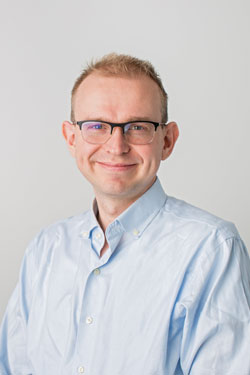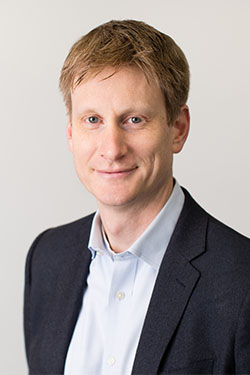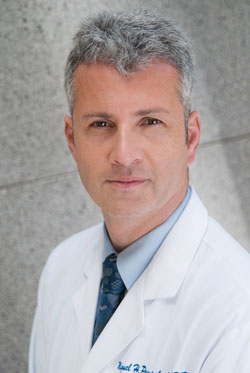UCSF Radiology Introduces A New Molecular Imaging and Therapeutics (MI&T) Clinical Section
The past decade has seen a number of new molecular diagnostic and therapeutic imaging agents enter clinical practice, especially in oncology, cardiology, and the neurosciences. The UC San Francisco Department of Radiology and Biomedical Imaging has served, decade after decade, as a hub for basic and translational research in this area driving the innovation of new agents, undertaking preclinical studies to demonstrate their potential and safety, and advancing their use for state-of-the-art clinical care.
To meet the challenges introduced at the cutting edge of a rapidly growing clinical field, the department is inaugurating a new clinical section, Molecular Imaging and Therapeutics (MI&T). This section will oversee the clinical practice of not only traditional nuclear medicine, but also the adoption of multimodality PET/CT and PET/MR and implementation of new diagnostic and therapeutic molecular agents for our patients. The section will also work closely with the Chemistry, Probes and Molecular Therapy (CPMT) Specialized Resource Group (SRG) within the department, as well as with clinicians and researchers in other departments to usher in a new generation of imaging and treatment modalities.
Meet MI&T Leadership
 Robert Flavell, MD, PhD, section chief, will oversee the overall operations of the new section, with an eye towards growth of its research, clinical, and educational missions. He received his BA from Wesleyan University, his PhD from the Rockefeller University, and his MD from Weill Cornell Medical College. He completed his radiology residency at UCSF, including an NIH T32-funded research fellowship, and continuing at UCSF with a fellowship in Nuclear Medicine.
Robert Flavell, MD, PhD, section chief, will oversee the overall operations of the new section, with an eye towards growth of its research, clinical, and educational missions. He received his BA from Wesleyan University, his PhD from the Rockefeller University, and his MD from Weill Cornell Medical College. He completed his radiology residency at UCSF, including an NIH T32-funded research fellowship, and continuing at UCSF with a fellowship in Nuclear Medicine.
Dr. Flavell's area of research interest is the development of new molecular imaging and therapeutic probes, with a particular focus on prostate cancer and how alterations in the tumor microenvironment drive disease progression. He has been recognized by early career awards from several societies and federal agencies, including the RSNA, Society of Nuclear Medicine and Molecular Imaging, Society of Abdominal Radiology, Prostate Cancer Foundation, Department of Defense, American Cancer Society, and National Institutes of Health. Moreover, Dr. Flavell has distinguished himself through quality improvement, clinical service and educational projects within the section of nuclear medicine.
A superlative physician, Dr. Flavell is also an outstanding scientist and an exemplary model for professionalism in our department.
 Thomas Hope, MD, director of molecular therapy for MI&T, will lead the introduction and use of molecular imaging-guided therapies. As part of this role, he will serve as chair the Cancer Center's new Molecular Imaging and Radionuclide Therapy Site Committee.
Thomas Hope, MD, director of molecular therapy for MI&T, will lead the introduction and use of molecular imaging-guided therapies. As part of this role, he will serve as chair the Cancer Center's new Molecular Imaging and Radionuclide Therapy Site Committee.
After receiving his undergraduate and medical degrees from Duke University and Stanford University, respectively, Dr. Hope completed his residency at UCSF and clinical fellowship in Body MRI and Nuclear Medicine at Stanford.
An international leader in PET/MR research and the translation of new molecular imaging agents, Dr. Hope launched the highly successful PSMA prostate program at UCSF and championed the use of multiple new targeted therapies to treat patients with neuroendocrine and other tumors. He currently serves as principal investigator on grants from the NIH, the Prostate Cancer Foundation. He is the recipient of numerous accolades in molecular imaging, including the Henkin Fellow and Marc Tetalman Memorial Award from the Society of Nuclear Medicine and Molecular Imaging, the Young Investigator Award from the Prostate Cancer Foundation and the Wylie J. Dodds Research Award from the Society of Abdominal Radiology.
Dr. Hope has achieved distinction through his international academic footprint championing molecular imaging and his vast experience in new agent program development.
 Miguel Hernandez Pampaloni, MD, director of nuclear cardiology for MI&T, will oversee nuclear cardiology and develop new techniques to evaluate cardiac metabolism and function. Along with Dr. Hope, he will also serve as vice-chair of the Cancer Center's new Molecular Imaging and Radionuclide Therapy Site Committee. He received his MD and PhD from the Universidad Complutense School of Medicine in Madrid and completed residencies in Nuclear Medicine at both San Carlos Hospital in Madrid and at the University of Pennsylvania.
Miguel Hernandez Pampaloni, MD, director of nuclear cardiology for MI&T, will oversee nuclear cardiology and develop new techniques to evaluate cardiac metabolism and function. Along with Dr. Hope, he will also serve as vice-chair of the Cancer Center's new Molecular Imaging and Radionuclide Therapy Site Committee. He received his MD and PhD from the Universidad Complutense School of Medicine in Madrid and completed residencies in Nuclear Medicine at both San Carlos Hospital in Madrid and at the University of Pennsylvania.
He also served as a postdoctoral fellow in Cardiovascular Nuclear Medicine in the UCLA Department of Medical and Molecular Pharmacology and at Hammersmith Hospital, Imperial College London, UK.
Dr. Pampaloni is published broadly and has spoken to national and international audiences on multiple topics in nuclear medicine and molecular imaging, especially quantitative myocardial blood flow and ischemic cardiomyopathy. He led the Nuclear Medicine section for a decade, during which time he directed the opening of operations at Mission Bay Hospital, helped to bring multiple new imaging and treatment agents to clinical practice, and guided the professional development of numerous highly successful residents, fellows and faculty. He has served as PI and co-investigator on multiple clinical trials and received numerous accolades for his scientific presentations.
Dr. Pampaloni is a world-class teacher, clinician, and researcher who is held in highest regard at UCSF, nationally and internationally.
Spencer Behr, MD and Courtney Lawhn Heath, MD will also join MI&T as core faculty.
